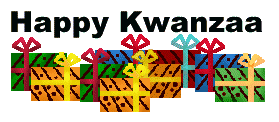| ~A celebration of family, community and culture~ 
Kwanzaa, pronounced KWAHN zuh, is an Afro-American holiday based on the traditional African festival of the harvest of the first crops. Celebrated around the world by millions of people of African descent, the week-long holiday of Kwanzaa was developed by the American scholar, a professor of Pan-African studies, black cultural leader and activist. Dr. Maulana Karenga in 1966. It takes place from December 26 to January 1, a time that some African cultures called "the edges of the time when the year meet" and is traditionally spent in celebration, focus and assessment. The word Kwanzaa, sometimes , spelled Kwanza and means "first fruits of harvest" in Swahili. It combines traditional African practices with Afro-American aspirations and ideals.
Seven principles:
 Umoja (unity), - to strive for and maintain unity in the family, community, nation and race.
Kujichagulia (self-determination),- to define oneself, name oneself, create for oneself and speak for oneself.
Ujima (collective work and responsibility), - to build and maintain the community together and to make each other's problems our problems and to solve them together.
Ujamaa (cooperative economics), - to build and maintain stores, shops and other businesses and to profit together from them.
Nia (purpose), - to make as a collective vocation the building and developing of the community order to restore the people to the traditional greatness.
Kuumba (creativity), - to do always as much as one can, in the best way possible, in order to leave the community more beautiful and beneficial than before.
and Imani (faith). - to believe in the family, the teachers, the leaders, the people and the righteousness and victory of the African-American struggle. | The holiday centers around the Nguzo Saba, seven principles of black culture that were developed by Karenga.These are considered the highest ethical and cultural values and are also known as the seven principles of African American community development. Swahili - Swahili, an East African people of Bantu lineage with some Semitic ancestry; they are Muslims and are noted as traders; number about 1,000,000
~From Compton's Interactive Encyclopedia~ Quoted from Festivals.com Kwanzaa Page: "Ten million African Americans celebrate Kwanzaa each year, as well as another eight million in Canada, England, Germany, the Caribbean, Africa and other countries." The Seven Symbols:
 | crops - Mazao - fruits and vegetables representing the first fruits of the harvest
a mat - Mkeka - a straw mat on which everything is placed
a candleholder - Kinara - a seven-branched candle holder which represents the seven principles and is placed in the center of the table
the seven candles - Mshumaa - are the seven candles -- one black, three red, and three green -- represent the seven principles
ears of corn - Muhindi - ears of corn to represent the number of children in the household and their potential
gifts - Zawadi - gifts that are enriching and encourage creativity.
a unity cup - the Kikome Cha Umoja - the communal unity cup used in prayers and blessings | Kwanzaa is represented by seven symbols. All seven symbols are put on a straw mat. The celebrants use the unity cup to pour libations for the ancestors, and they drink from it to reinforce unity in the family and community. The 7 candles in a kinara (candleholder) are lit alternately from left to right. In the evening, family members light one of the seven candles in a kinara (candleholder) and discuss the principle for the day. On the first night, the black candle in the center, symbolizing the black people, is lit; on the second night, the black one and the first candle to its left, a red one, symbolizing their struggle; on the third night, the first two and the green one to the right of the black one, which symbolizes the future and hope which comes from the struggle; and so on each night, alternating left to right. Gifts, such as books or heritage symbols relating to the history, culture, or community of African Americans are exchanged; they are primarily given to children, but other family members can exchange gifts. Some of the gifts are homemade. Near the end of the holiday, the community gathers for a feast called karamu. A typical karamu features traditional African food, ceremonies honoring the ancestors, assessments of the old year and commitments for the new, performances, music, and dancing.  kawanzza click on the link above and it will take you to the hoilday craft page area
|
 Free Forum Hosting
Free Forum Hosting